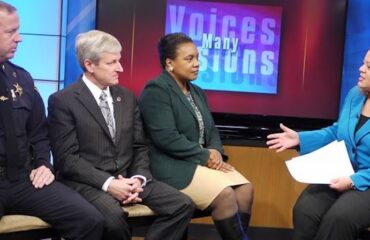Justice Speaks Podcast #71
In this episode of Justice Speaks, we continue our series with State Drug Court Coordinators through an interview with Ms. Kaylee Dickenson, the State Drug Court Coordinator for West Virginia. This episode is sponsored by Reconnect.
About Kaylee Dickenson

Ms. Dickenson begins by detailing her early career in corrections at the Southern Regional Jail and Beckley Correction Center, experiences that laid the foundation for her transition into probation—a role that first introduced her to Treatment Courts. In her capacity as a probation officer, she engaged with treatment-focused justice by attending the State Drug Court Conference and managing adult Drug Courts in Greenbrier and Pocahontas counties. Her accomplishments in these counties and her commitment to therapeutic justice led to her promotion as a Treatment Court evaluator, where she oversaw evaluations for Family Treatment Courts and then to State Drug Court Coordinator. In her role, Ms. Dickenson ensures that Treatment Courts across all 55 West Virginia counties adhere to best practice standards, providing tailored feedback and guidance to enhance each court’s impact on participants and the broader community.
Essential Training and Resources for West Virginia’s Treatment Courts
A key theme in her discussion is the systematic approach to treatment court coordination in West Virginia. Ms. Dickenson elaborates on her role in organizing the State Treatment Court Conference, a biennial event funded by the Bureau of Justice Assistance that delivers essential training and resources to judges, probation officers and other Treatment Court team members statewide. This conference, which is free for attendees, serves as a platform for knowledge sharing on emerging best practices and evidence-based approaches. Working closely with an educational committee, Ms. Dickenson is involved in all aspects of conference planning, ensuring that treatment courts remain informed about the latest advancements in supporting participants.
The Effectiveness of Treatment Courts in West Virginia
Ms. Dickenson also addresses West Virginia’s unique funding model for treatment courts, which is supported by the Supreme Court of Appeals. This model establishes structured budgets for juvenile Drug Courts, with annual allocations for incentives and graduation ceremonies, distinguishing them from adult Drug Courts, which require participants to contribute toward incentives. She emphasizes that this funding model ensures the availability of necessary resources to reward progress and milestones while promoting accountability in adult programs. The effectiveness of this model is reflected in the state’s low recidivism rate of 12% and the graduation of 1,382 participants since the program’s inception, with only a small percentage reoffending. These statistics underscore the long-term success of West Virginia’s Treatment Courts in reducing re-arrest rates and facilitating positive outcomes for participants.
Further, Ms. Dickenson highlights the performance of both the Drug and Family Treatment Court programs, which report a 100% graduation rate and a 100% employment rate among participants. This achievement demonstrates the dedication of both Treatment Court staff and participants. She also mentions potential future measures, such as tracking recidivism rates among terminated participants, to gain a comprehensive view of program effectiveness and areas for improvement. Notably, all graduates of the juvenile Drug Court program have successfully completed high school, reflecting the supportive environment fostered within these treatment programs.

Challenges and the Future of Treatment Courts in West Virginia
The conversation also addresses the challenges faced in administering Treatment Courts in rural West Virginia. Ms. Dickenson outlines logistical hurdles, particularly in providing personalized treatment plans and ensuring transportation options for participants who often travel significant distances. She emphasizes the essential role of local day report centers in addressing these needs.
Finally, Ms. Dickenson describes her vision for the future of Drug Courts in West Virginia, anticipating the expansion of Juvenile and Family Treatment Courts, increased collaboration with mental health providers, and a shift toward judicial roles dedicated exclusively to overseeing Treatment Courts
We wish to thank Ms. Dickenson for sharing her insights and experiences on Justice Speaks, and to Reconnect for sponsoring this episode.
Additional Resource
You can watch this interview by going to the Justice Speakers Institutes’ YouTube Channel or by clicking here.
Get more articles like this
in your inbox
Subscribe to our mailing list and get the latest information and updates to your email inbox.
Thank you for subscribing.
Something went wrong.






